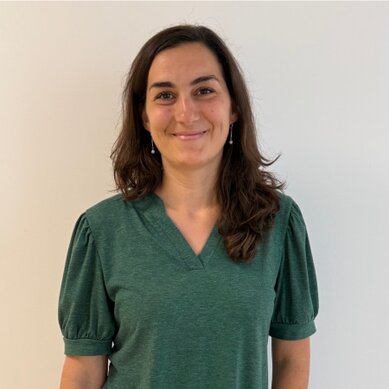
Alexandra Avgustinova
Jefe de Grupo
Research group
Alexandra Avgustinova graduated with a BA in Biological Sciences from the University of Oxford (Oxford, UK) in 2005. She undertook her PhD under the mentorship of Prof. Clare Isacke at the Institute of Cancer Research (London, UK) studying the role of the tumour stroma in breast cancer progression. In 2013 she joined the laboratory of Dr. Salvador Aznar Benitah at the Institute for Research in Biomedicine (Barcelona, Spain) as a postdoctoral fellow to investigate the repercussions of deregulated chromatin accessibility on development and disease. Since 2020 she leads the Paediatric Tumour Epigenetics Group at the Institut de Recerca Sant Joan de Déu.
As leader of the Paediatric Tumour Epigenetics Group, Dr. Avgustinova aims to elucidate how epigenetic parameters impact developmental tumour biology, and how epigenetic targeting can be used in the clinic to synergise with established standard- of-care treatments.
Specifically, her group addresses (1) how epigenetic alterations can cause malignant transformation; (2) whether epigenetic deregulation alters the evolutionary potential of tumours by impacting their mutation rate; and (3) how the epigenomic landscape of the tumour influences the patient’s anti-tumour immune response by altering tumour cell immunogenicity.
Last Publications
- Figuerola-Bou E, Rios-Astorch C, Blanco E, Sanchez-Jimenez M, Táboas-Outón P, Fernandez-Isern G, Gomez-Gonzalez S, Muñoz-Aznar O, Castellano-Escuder P, Pérez-Jaume S, Garcia-López M, Prada-Varela E, Mateo-Lozano S, Riggi N, Avgustinova A, Lavarino C, Di Croce L, Sánchez-Molina S and Mora J KDM6 Demethylases Contribute to EWSR1::FLI1-Driven Oncogenic Reprogramming in Ewing Sarcoma CANCER RESEARCH . 85(22): 4485-4503.
- Prada-Varela E, Táboas-Outón P, Andrades E, Gomez-Gonzalez S, Mateo-Lozano S, Cebrià A, Berenguer-Molins P, Perera-Bel J, Arcon JP, Saen-Oon S, Díaz L, Gay M, Folch-I-Casanovas I, Odena A, Vilaseca M, Rovira Q, García-Gerique L, Rodriguez E, Rovira-Zurriaga C, Rodrigues G, Carcaboso AM, Avgustinova A, Hernandez-Muñoz MI and Mora J PRKG1 hinders myogenic differentiation and predicts response to AKT inhibitor ipatasertib in Rhabdomyosarcoma Nature Communications . 16(1): 9816-9816.
- Sentís I, Melero JL, Cebrià A, Grzelak M, Soto M, Michel A, Rovira Q, Rodriguez-Hernandez CJ, Caratù G, Urpi A, Sauvage C, Mendizabal-Sasieta A, Maspero D, Lavarino C, Pascual-Reguant A, Castañeda-Heredia A, Muñoz Perez JP, Mora J, Harari A, Nieto JC, Avgustinova A and Heyn H Spatiotemporal T-cell tracking for personalized T-cell receptor T-cell therapy designs in childhood cancer ANNALS OF ONCOLOGY . 36(9): 1096-1106.
Projects
- Project name:
- ONCO-COMP_Oncogenic competence during development – When, Where and Why?
- Leader
- Alexandra Avgustinova
- Funding entities:
- European Commission, Fundació Privada per a la Recerca i la Docència Sant Joan de Déu - FSJD, Rodriguez Hernandez, Carlos Javier
- Code
- 101076506
- Starting - finishing date:
- 2023 - 2028
- Project name:
- PFEC0013 - Coordinación PFE00104_ONCO-COMP_Alexandra Avgusti
- Leader
- Alexandra Avgustinova
- Code
- PFEC0013
- Starting - finishing date:
- 2023 - 2028
- Project name:
- SGR 2022-2024_Grup de recerca en tumors del desenvolupament
- Leader
- Jaume Mora Graupera
- Funding entities:
- Agaur - Agència de Gestió d'Ajuts Universitaris i de Recerca
- Code
- 2021 SGR 01612
- Starting - finishing date:
- 2022 - 2025
News
-
An aggressive childhood cancer case opens new avenues for advanced cell therapies
A positive response to therapy in a paediatric patient with a renal rhabdoid tumour has enabled researchers to identify immune cells with anti-tumour activity in this rare cancer.
-
Researchers from IRSJD and IRB Barcelona unveil the origin of second pediatric cancers and chemotherapy-induced mutations in healthy tissues
A team from Institut de Recerca Sant Joan de Déu and IRB Barcelona has studied the cases of four children who have experienced two cancers during childhood and has addressed the origin of the second tumour. The work has been published in the journal Cancer Discovery.
-
IRSJD and IRB Barcelona strengthen their research collaboration in pediatric cancer
The agreement includes the opening of a laboratory, led by Dr. Alexandra Avgustinova, which will address the specific vulnerabilities of developmental tumours to discover new therapeutic approaches. The shared Pediatric Cancer Epigenetics laboratory will be located on IRB Barcelona premises.

 ResearchGate
ResearchGate